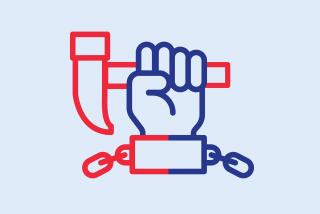Labor Department Proposes Repeal of Ban on Garment, Jewelry Work at Home
- Share via
The Labor Department Friday proposed repealing long-standing federal regulations barring certain types of commercial garment production and jewelry manufacturing from being done by workers in their homes.
The proposal would permit home work in several industries, including the making of buckles, buttons, embroidery, gloves, handkerchiefs, mittens and jewelry work that does not involve hazardous substances or processes.
The ban on production of women’s apparel in the home, first enacted in 1942, and prohibition against the manufacture of jewelry requiring use of hazardous substances would remain, department officials said.
Under Labor Department policy, the public has 30 days to comment on the proposed rules. Then the department may decide whether to enact the changes. Any new rules would have only limited effect in California which has separate state laws regulating work at home.
Friday’s proposal represents a scaling back of a controversial August, 1986, Labor Department plan to lift the home work ban entirely. That proposal drew 19,000 comments, many of them critical, according to department officials.
For the last several years, a debate has raged between organized labor and conservative groups on whether repeal of the ban would allow more people to enter the work force and work at places and times they choose or pave the way for a return to the sort of sweatshop conditions that precipitated the ban during World War II.
‘Common Sense’
Secretary of Labor Ann D. McLaughlin said the new plan, which could affect between 10,000 and 100,000 workers, “represents a common sense approach to maximizing flexibility and economic freedom for workers in a way that ensures worker protection in a home environment.”
Some business organizations, including the U.S. Chamber of Commerce, said they were pleased with the proposal. “We think it’s a good idea,” said Frederick Krebs, director of the chamber’s employee relations policy center. “In these changing times, it recognizes that there are real advantages to working at home.”
But organized labor served notice Friday that it would resist the proposal.
“We will oppose vigorously this betrayal of the rights and protections held by American workers for generations,” said Jay Mazur, president of the 200,000-member International Ladies Garment Workers Union (ILGWU). Mazur said the union would go to court if the Labor Department is not dissuaded by arguments raised during the forthcoming 30-day comment period. He said the ILGWU would be joined in this effort by the Amalgamated Clothing and Textile Workers Union and by the Service Employees International Union, which represents 6,000 jewelry workers.
Mazur asserted that the plan would lead to a “rebirth of the industrial dark ages” and said it would “invite unscrupulous employers to impose home work at below legal wages and under substandard conditions on the most vulnerable workers in American society, recent immigrants and poor women.”
Certificate Required
In order for a company to legally employ people who would work in their homes, a company would have to obtain a certificate from the Labor Department’s Wage and Hour Division. Linda Tavlin, a department spokeswoman, said the department could revoke certifications and fine companies that violated minimum wage laws or other federal statutes. But Mazur said the department’s attempt to enforce licensing regulations on knitted outer wear work in homes, which has been legal since 1984, has been an “abysmal failure.”
The DOL said Friday that it would not issue certificates to employ home workers in states that prohibit home work in the affected industries.
In California, industrial home work would be permitted for jewelry making, embroidery for non apparel items, such as tablecloths, and buckles that are not made with a belt, according to a spokesman for the state division of industrial relations. Other home work would still be banned under state law, he said.
However, Steven Nutter, western regional director of the ILGWU, said there were a growing number of violations of the state law already. And he asserted that the new Labor Department plan would tend to “create a climate” that would exacerbate the situation.
Moreover, Nutter said, the prevalence of industrial home work has been growing in California as a consequence of companies attempting to continue employing illegal immigrants while avoiding the penalties of the Immigration Reform and Control Act of 1987.
Workers’ Requests
The Labor Department said Friday that the proposed regulations respond to various requests by home workers. The material the department issued Friday included comments, submitted to the department, from workers and companies opposed to the ban. One of them came from a self-described single mother from Wyoming: “I would very much like to stay home with my son. As I have received no financial help from my ex-husband, I am sole provider for my child. Being able to work at home would help myself and other single parents very much.”
More to Read
Sign up for Essential California
The most important California stories and recommendations in your inbox every morning.
You may occasionally receive promotional content from the Los Angeles Times.










